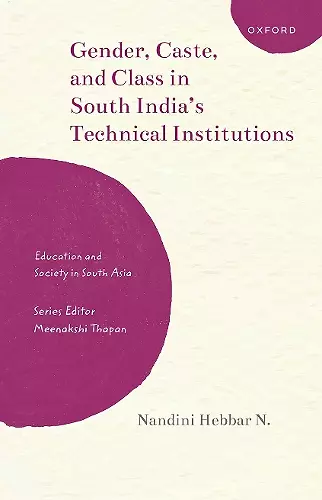Gender, Caste, and Class in South India's Technical Institutions
Format:Hardback
Publisher:Oxford University Press
Published:31st Aug '24
£90.00
Supplier delay - available to order, but may take longer than usual.

With a wide arc encompassing the institutional big men, who run technical institutes and colleges, and the micro-politics of friendships and relationships, this book is a deep dive into the world of Indian engineering colleges. It juxtaposes the stark realities and lived experiences of students against the global sensibilities and standards to which such institutes lay claim. From the 1980s to the early 2000s, Tamil Nadu witnessed a record rise in the number of private engineering colleges. However, despite the manifold increase in the number of institutions and consequently, first-generation learners, hierarchies and inequalities continue to be reproduced in these almost temple-like institutions. Groups lacking the explicit markers of cultural and social capital struggle to find employment. By presenting perspectives on engineering students desires, anxieties, and processes of self-construction, the monograph examines how gender differences are reinforced through language, rules, regulations, surveillance, and control. In shifting the theoretical emphasis from subjects to subjectivities, Hebbar draws on the youths narratives of upward social mobility, crafting respectability, and notions of adulthood, holding a mirror to the fraught social scape of Indias private education sector.
Through its engaging ethnographic writing and sharp theorization of questions of gender, caste, and class, this book is an insightful study of youth culture and student aspirations in a private engineering college in Tamil Nadu and constitutes an important contribution to the sociology of post-liberalization India. Hebbar skilfully uncovers the ways in which young women students negotiate with gendered norms of 'respectability' imposed by their families, communities, and the college itself, and portrays with sensitivity their hopes, dilemmas, and disappointments. * Carol Upadhya, Honorary Visiting Professor, National Institute of Advanced Studies, Bengaluru *
Nandini Hebbar's book is a fascinating exploration into the world of private engineering education in South India. Based on intensive fieldwork, it unveils the connections between the interests of 'big men' who control such education and the social mobility desires of families that drive gendered investments in children, the aspirations of girls, and the role of gender, caste, and class in shaping their educational outcomes. * Ravinder Kaur, Emerita Professor, Department of Humanities and Social Sciences, Indian Institute of Technology Delhi *
Through a study of young women in an engineering college in Tamil Nadu, Nandini Hebbar weaves together a range of critical issues to tell a story about contemporary India -- about caste and higher education, the aspirations of young women, of caste identities and pride, of familial anxieties, restrictions, and control. Written in a highly readable and clear style, this rich ethnography should be taught in undergraduate and postgraduate social science programmes in India and abroad. * Janaki Abraham, Professor, Department of Sociology, Delhi School of Economics, University of Delhi *
ISBN: 9780198914457
Dimensions: 85mm x 55mm x 8mm
Weight: 882g
272 pages